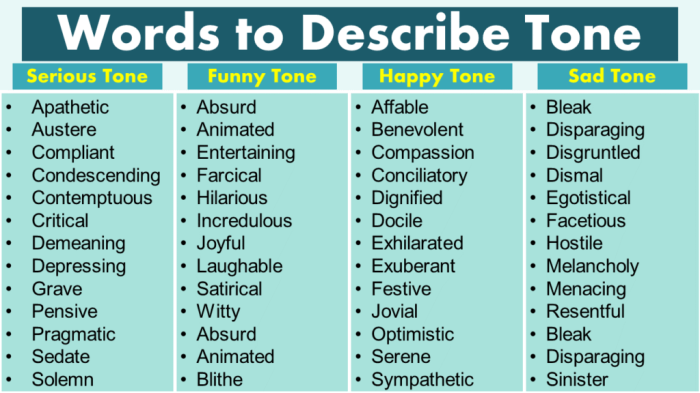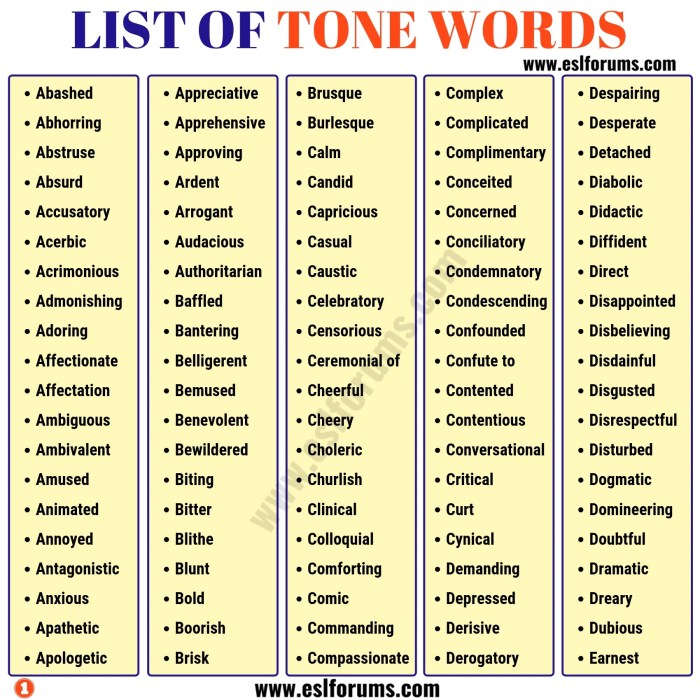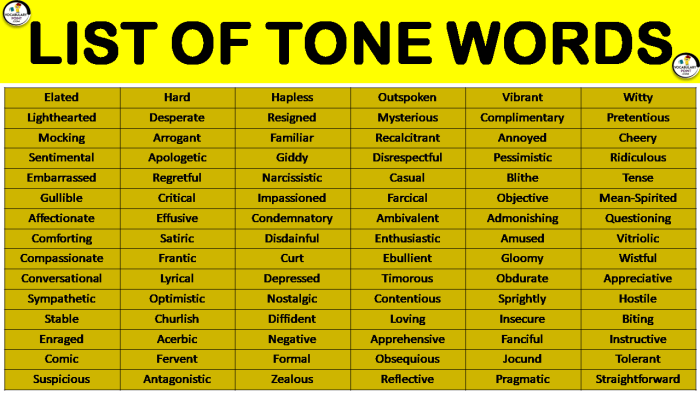Which words best describe the tone of the passage – Delving into the realm of linguistic analysis, we embark on a captivating journey to explore which words best describe the tone of a passage. This comprehensive guide serves as an authoritative resource, providing a systematic approach to deciphering the emotional atmosphere and subtle nuances conveyed through written language.
By examining dominant tones, figurative language, sentence structure, diction, and contextual factors, we unravel the intricate tapestry of words that shape the overall impact of a passage, empowering readers to become discerning interpreters of written communication.
Identifying the Dominant Tone

The overall emotional atmosphere of a passage is referred to as its tone. This atmosphere is conveyed through the author’s choice of words, sentence structure, and figurative language. Identifying the dominant tone is crucial for understanding the author’s purpose and perspective.Specific
examples of words or phrases that convey tone include:
- Positive tone: cheerful, optimistic, uplifting
- Negative tone: pessimistic, cynical, disapproving
- Neutral tone: objective, informative, unbiased
- Humorous tone: witty, playful, lighthearted
- Serious tone: grave, somber, thoughtful
Analyzing the Use of Figurative Language
Figurative language adds depth and vividness to a passage. Metaphors, similes, and other figures of speech can create unexpected connections, evoke emotions, and enhance the reader’s understanding.
- Metaphors:Imply a direct comparison without using “like” or “as” (e.g., “Life is a journey.”)
- Similes:Compare two things using “like” or “as” (e.g., “Her eyes were like sparkling diamonds.”)
- Personification:Give human qualities to nonhuman things (e.g., “The wind whispered secrets to the trees.”)
Figurative language can contribute to tone by:
- Creating vivid imagery
- Eliciting emotions
- Establishing a specific mood
- Emphasizing key points
Examining the Sentence Structure and Syntax: Which Words Best Describe The Tone Of The Passage
Sentence structure and syntax play a significant role in shaping the pace and flow of a passage.
- Short, simple sentences:Create a sense of urgency or immediacy
- Long, complex sentences:Conveys a more formal, reflective tone
- Parallel structure:Creates a sense of rhythm and balance
- Inverted syntax:Can emphasize certain words or phrases
The choice of sentence structure and syntax can impact the reader’s engagement and comprehension.
Evaluating the Choice of Diction

The specific words used by the author contribute significantly to the tone of the passage.
- Connotative words:Carry emotional associations (e.g., “love” vs. “affection”)
- Denotative words:Have a precise, objective meaning (e.g., “dog” vs. “canine”)
- Jargon:Specialized language used by a particular group (e.g., “algorithm” in computer science)
- Slang:Informal, non-standard language (e.g., “cool” vs. “excellent”)
The choice of diction can:
- Establish the author’s credibility
- Convey the author’s attitude towards the subject
- Appeal to a specific audience
Considering the Context

The purpose and genre of a passage influence its tone.
- Informative:Objective, factual, and straightforward
- Persuasive:Aims to convince or persuade the reader
- Narrative:Tells a story or recounts events
- Literary:Focuses on aesthetic qualities and imaginative language
The context of a passage provides clues about the author’s intended tone and helps the reader interpret the passage accurately.
Key Questions Answered
How can I determine the dominant tone of a passage?
Identify the overall emotional atmosphere conveyed by the language, supported by specific examples of words or phrases that evoke that tone.
What is the significance of figurative language in shaping tone?
Metaphors, similes, and other figures of speech can enhance the tone by creating vivid imagery, emphasizing emotions, or conveying deeper meanings.
How does sentence structure impact the pace and flow of a passage?
Short, concise sentences can create a sense of urgency or emphasis, while long, complex sentences can convey a more formal or contemplative tone.
Why is it essential to consider the choice of diction?
Specific words convey specific emotions and connotations, and the author’s vocabulary choices can significantly shape the tone of the passage.
How does the context of a passage influence its tone?
The purpose and genre of a passage provide important clues about the expected tone, as different contexts call for different linguistic conventions.